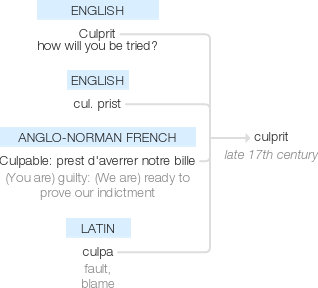Culprit
late 17th century (originally in the formula Culprit, how will you be tried?, said by the Clerk of the Crown to a prisoner pleading not guilty): perhaps from a misinterpretation of the written abbreviation cul. prist for Anglo-Norman French Culpable: prest d'averrer notre bille ‘(You are) guilty: (We are) ready to prove our indictment’; in later use influenced by Latin culpa ‘fault, blame’.
wiktionary
From Anglo-Normancul. prit, contraction of culpable: prest ( d' averrer nostre bille) 'guilty: ready (to prove our case)', words used by prosecutor in opening a trial, mistaken in English for an address to the defendant. See culpable.
etymonline
culprit (n.)
1670s, "person arraigned for a crime or offense," according to legal tradition from Anglo-French cul prit, a contraction of Culpable: prest (d'averrer nostre bille) "guilty, ready (to prove our case)," words used by prosecutor in opening a trial. See culpable. It seems the abbreviation cul. prit was mistaken in English for an address to the defendant.
Meaning "a criminal, an offender" (1769) is, according to OED, "A change of sense, apparently due to popular etymology, the word being referred directly to L. culpa fault, offense."
